Aquarium lovers frequently choose betta fish because of their eye-catching colors and graceful fins. But keeping these beautiful fish healthy requires more than just a well-maintained tank; their diet plays a crucial role.
“Can betta fish eat tropical fish food?” is a question that many betta owners have. is a query that a lot of people have. The answer is more difficult to figure out than it seems at first. This article will delve into the dietary needs of bettas, compare them with tropical fish food, and help you make an informed decision about what’s best for your fish.
Betta Fish Dietary Needs
Betta fish are carnivores by nature, which means their diet in the wild consists primarily of insects, larvae, and small crustaceans. This diet is rich in protein, which is essential for their growth, energy, and overall health. Unlike omnivorous tropical fish, bettas require a higher protein intake to thrive.
What Is Tropical Fish Food?
Tropical fish food is designed to meet the dietary needs of a variety of fish species that share similar habitats. These foods typically contain a mix of plant and animal-based ingredients to provide a balanced diet. They come in different forms such as flakes, pellets, and granules, and are intended for species that are either omnivorous or herbivorous.
Can Betta Fish Eat Tropical Fish Food?
While betta fish can technically eat tropical fish food, it is not an ideal choice for their regular diet. Tropical fish food is often lower in protein and higher in plant-based ingredients than what bettas require. However, it can be used as an occasional supplement to their diet, provided it meets certain nutritional criteria.
Nutritional Comparison: Betta Food vs. Tropical Fish Food
Protein Content Comparison
Betta-specific food typically contains higher levels of protein, often around 40-50%, which is crucial for their health. In contrast, tropical fish food generally has a lower protein content, around 20-30%, which might not be sufficient for bettas if fed regularly.
Essential Nutrients Required by Bettas
Bettas need specific nutrients like amino acids, vitamins, and minerals that are not always present in the right proportions in tropical fish food. Without these nutrients, bettas may suffer from various health issues.
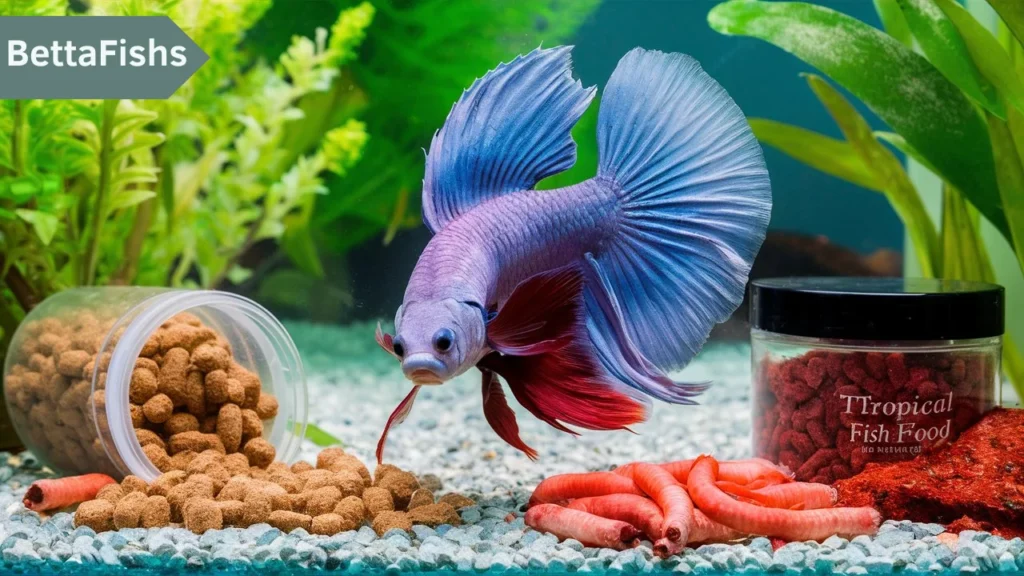
Pros and Cons of Feeding Tropical Fish Food to Bettas
Advantages of Using Tropical Fish Food
- Variety: It can introduce variety to your betta’s diet, which can be beneficial.
- Availability: Tropical fish food is widely available and might be convenient if you run out of betta-specific food.
Potential Drawbacks and Risks
- Nutritional Deficiency: Long-term feeding of tropical fish food could lead to protein deficiency and related health problems.
- Digestive Issues: Bettas might have difficulty digesting food that contains a higher percentage of plant-based ingredients.
Signs Your Betta Is Not Getting Proper Nutrition
Common Health Issues Due to Poor Diet
Bettas deprived of adequate nutrition may exhibit signs such as fin rot, color fading, and lethargy. These issues often stem from a diet lacking in essential proteins and nutrients.
Behavioral Signs of Nutritional Deficiencies
A betta that is not getting the right nutrition might become less active, lose its appetite, or show signs of stress, such as excessive hiding or aggression.
Best Food Options for Betta Fish
Commercial Betta-Specific Pellets
These are specifically formulated to meet the dietary needs of bettas, offering the right balance of protein and other nutrients.
Frozen and Live Food Options
Foods like bloodworms, brine shrimp, and daphnia are excellent choices, providing a diet close to what bettas would eat in the wild.
Homemade Food Options for Bettas
Some betta owners opt to prepare homemade food using fresh ingredients like shrimp, fish, and vegetables, ensuring that their betta receives a balanced diet.
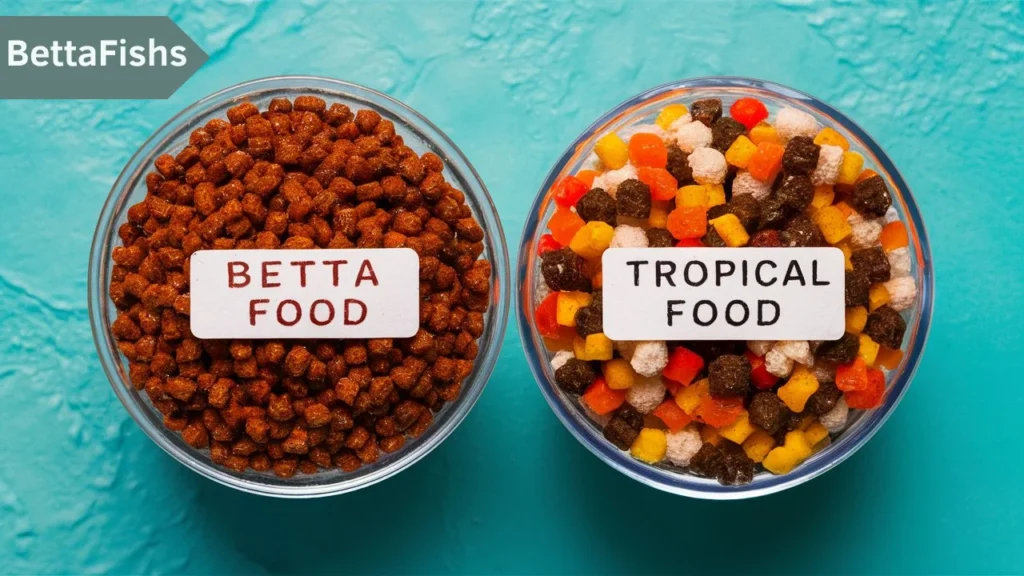
How to Choose the Right Tropical Fish Food for Bettas
Reading Labels and Understanding Ingredients
When selecting tropical fish food for your betta, it’s crucial to read the label carefully. Look for options with higher protein content and minimal fillers.
Ensuring a Balanced Diet with Tropical Fish Food
If you decide to feed tropical fish food, ensure it’s part of a varied diet that includes betta-specific food and other protein-rich options to balance out their nutritional intake.
How Often Should You Feed Your Betta Tropical Fish Food?
Recommended Feeding Schedule
Feeding tropical fish food to your betta should be done sparingly, perhaps once or twice a week, in combination with their regular betta food. This helps avoid nutritional imbalances.
Balancing Tropical Fish Food with Betta-Specific Food
It’s important to maintain a balance between tropical fish food and betta-specific food. Bettas thrive on a consistent, protein-rich diet, so tropical fish food should never replace their primary source of nutrition.
Tips for Feeding Betta Fish
Portion Control and Avoiding Overfeeding
In betta fish, overfeeding can cause obesity and other health problems. Always feed them in small portions and remove any uneaten food to maintain water quality.
Creating a Varied Diet for Better Health
A varied diet not only keeps your betta healthy but also prevents boredom. Rotate between different types of food, including pellets, frozen food, and occasional tropical fish food.
Common Mistakes to Avoid When Feeding Betta Fish
Overfeeding and Underfeeding Issues
Overfeeding can cause bloating and constipation while underfeeding can lead to malnutrition. It is necessary to maintain the correct balance.
Choosing the Wrong Type of Food
Not all tropical fish food is suitable for bettas. Avoid foods with high levels of plant-based ingredients or low protein content, as these can negatively impact your betta’s health.
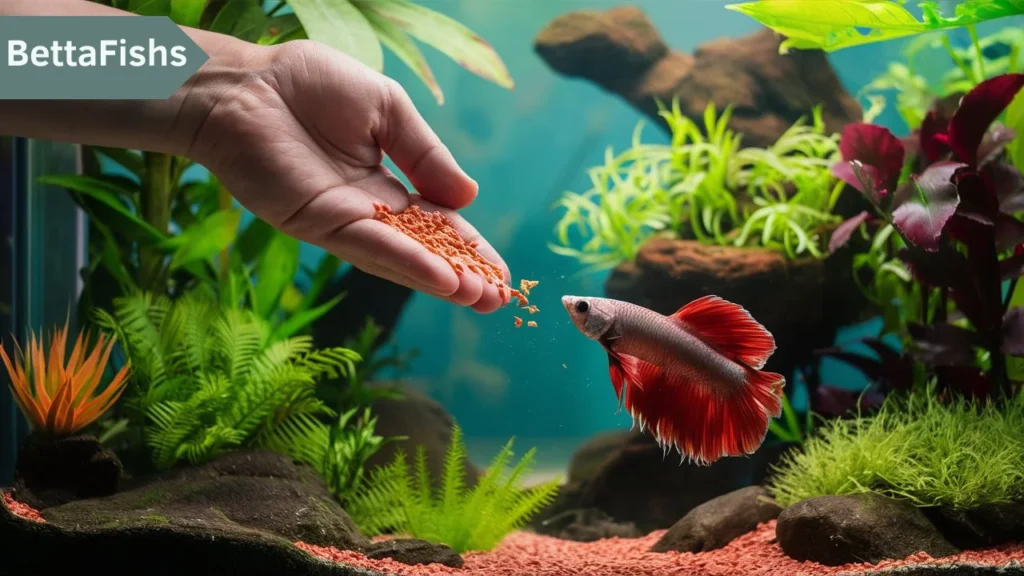
Conclusion
In conclusion, while betta fish can eat tropical fish food, it should not replace their regular diet. Bettas require a high-protein, nutrient-rich diet to thrive, and tropical fish food often falls short in providing these essential nutrients. However, when used sparingly and as part of a varied diet, tropical fish food can offer some benefits. Always prioritize betta-specific food and supplement with occasional tropical fish food to ensure your betta remains healthy and vibrant.
FAQs
Can Bettas Survive on Tropical Fish Food Alone?
While bettas can survive on tropical fish food, it is not ideal for their long-term health. A diet primarily composed of betta-specific food is recommended.
What Happens If a Betta Doesn’t Eat for a Day?
Bettas can go without food for a day without any issues. However, prolonged fasting can lead to health problems.
How to Introduce New Food to Bettas?
Introduce new food gradually, mixing it with their regular diet to avoid digestive issues and ensure they accept the new food.
Should Betta Fish Food Be Soaked Before Feeding?
Soaking pellets before feeding can help prevent bloating, especially if the food tends to expand in water.
Can Bettas Eat Flakes Made for Other Fish?
While bettas can eat fish flakes, they are not ideal as a primary food source due to lower protein content and potential nutritional gaps.


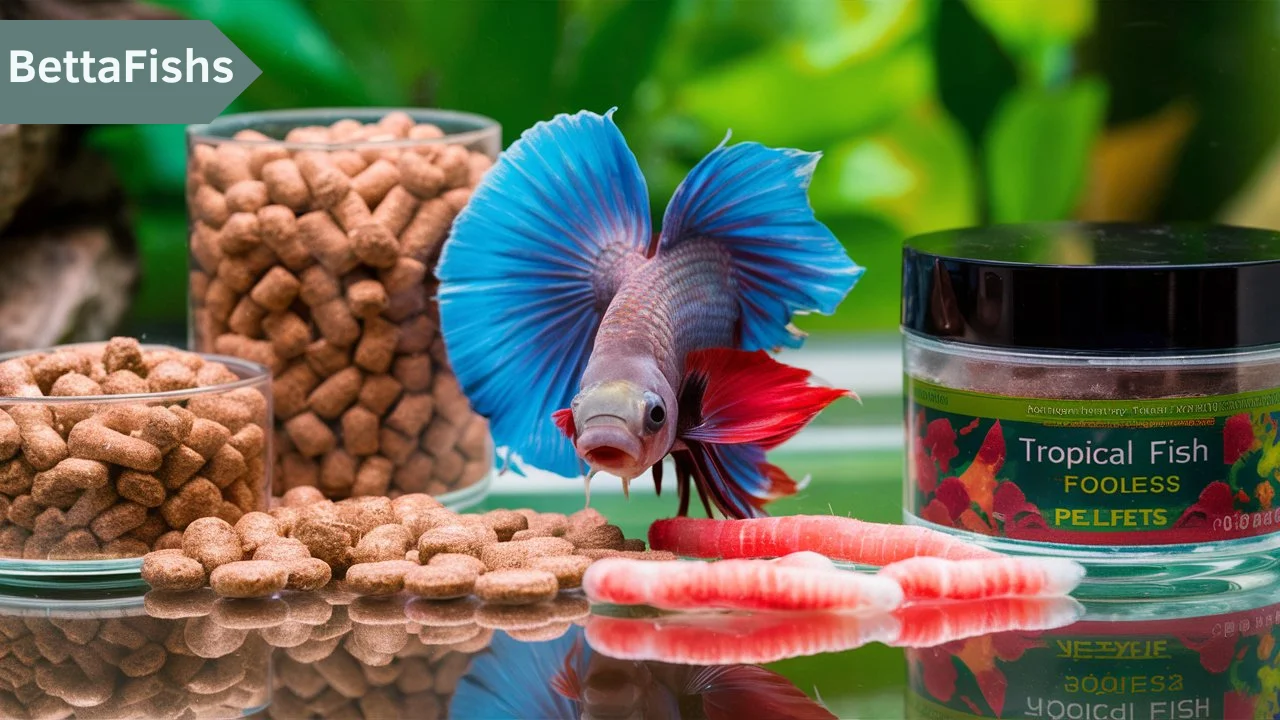
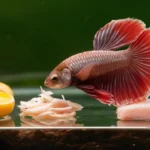
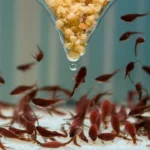
One Comment
Leave a ReplyOne Ping
Pingback:How long does a Betta fish live without food?